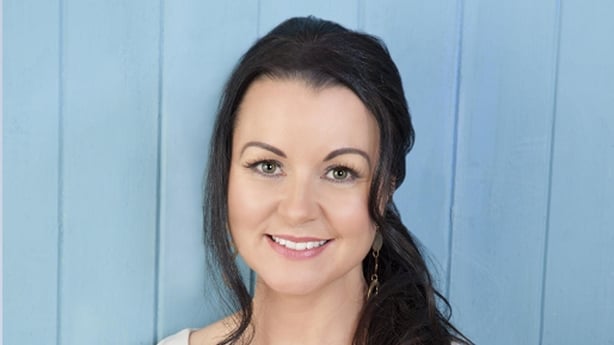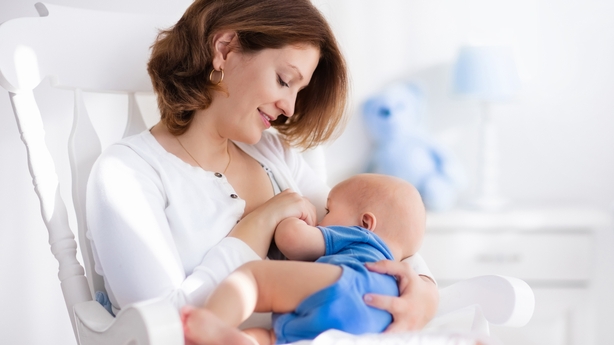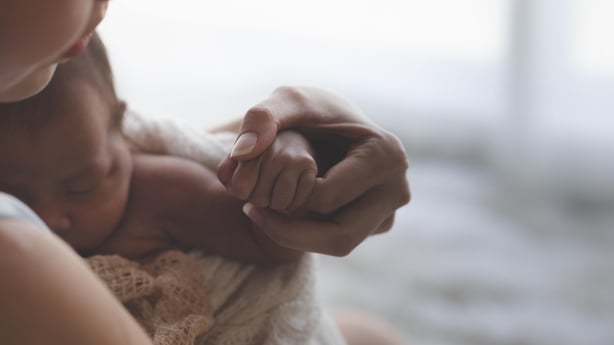For some people, the last few months have been some of the quietest they've ever had. And then there's Louise Lennox.
The chef and broadcaster welcomed a new baby girl, Lottie Beau, just four weeks ago, a surprise that came even to Kathryn Thomas, who spoke to Louise on The Ray D'Arcy Show.
The chef behind Foodoppi says she kept the pregnancy secret, making the most of the quiet lockdown months. "No one knew I was pregnant except friends and family!"

"I learned to stand certain ways in front of the camera so a little bump didn't come out because with repeats and reruns it looks like you've had 10 kids 15 years later. A silver lining of lockdown was I didn't have to go out anywhere or see anyone."
Louise says her quiet pregnancy was in part influenced by her first pregnancy when her son Alex was born 30 weeks premature, an experience that she now knows left her with Post Traumatic Stress Disorder.
"My way of coping with this pregnancy was taking it day by day and not having to answer too many questions until a healthy happy baby arrived", she tells Kathryn.
Seven years later, Louise says she feels like she's "a brand new mother", both because of the time between pregnancies and her new method of breastfeeding.
This week is World Breastfeeding Week, so she's sharing her experience of getting to grips with breastfeeding.
The innocence of a child. Completely oblivious to the global world epidemic #coronavirus is causing. With all the closures of children's activities, we went to the beach and created art using sand, stones and seaweed. The best things in life are free. Sending a smile to everyone pic.twitter.com/zkLcYZflPK
— Louise Lennox (@LouiseLennox_) March 14, 2020
"With Alex, I express breastfed because he was premature so it was the only way of feeding him", she explains. "That was fine because machines, they turn on and when you need them to turn off they finish, whereas human beings are a little bit different. You can't work them that way!"
She adds she has "a whole new respect for breastfeeding" since starting with Lottie Beau. "I thought it was as simple as latch the baby on, the baby eats and that's good. It has been a little bit more tricky than that, because I've a great milk supply – which I thought was a big tick – but I didn't realise there are other factors to it."
"I'm going to be honest, I'm finding it challenging. But when I know all the good stuff it does, and I've a great supply, it makes me determined to power on and come over the obstacles."
Before speaking to Kathryn, she met with a lactation consultant, something Kathryn herself did when having her daughter Ellie and she says it "changed my entire understanding and relationship and success" with breastfeeding.
"What I did learn was mother's good instinct is the best because she wasn't feeding well and she was getting distressed", Louise says. "Who knew you should hold a baby [in a certain way] – they call it the rugby ball hold!"

"You really think it's easy and one size fits all and then they come up and you realise it's not."
Although the breastfeeding is new to her, Louise will be keeping up a tradition that started with her first pregnancy: donating her breast milk to the Human Breast Milk Bank, which supplies babies in need in both the north and south of Ireland.
"Little premature babies, depending on what time they're born at, they don't develop a suckle at 30 weeks in the womb so they need to learn that", she says. "They're tube-fed through a syringe. I had an oversupply of breast milk ... so I was lucky."
"As I was coming out of the express breastfeeding room, another mom was going in ... she was desperately upset because she had very low milk supply, feeling guilty that her baby needs this breast milk and she can't give it to her. I remember saying, 'do you want some of mine?' I was there going, 'Is this illegal?'"
"I just wanted to help her." A nurse referred her to the Human Breast Milk Bank but Louise admits that, at first, she wasn't sure how she felt about donating.
"I didn't know how I felt about donating my milk, having other babies have it. I didn't know how comfortable I felt."

But then, seeing families in need helped make up her mind. "When you're in the neonatal unit and you see the tiny babies and you see the parents ... I couldn't but do it. I felt so compelled to do it."
To donate your milk, she explains, you contact the milk bank, which then sends you a questionnaire to fill out and hospital-grade milk bottles to express your milk into. Mums can express in their own time over the course of three months, freezing the milk until a big enough supply is built up. You then send the milk on to the bank.
This bank is open to mothers who have had a baby less than 12 weeks old, and they can donate up until they're six months old.
Louise stresses that once she found out she was pregnant she knew she'd donate her milk again. "It really is liquid gold, and you can't manufacture it."

